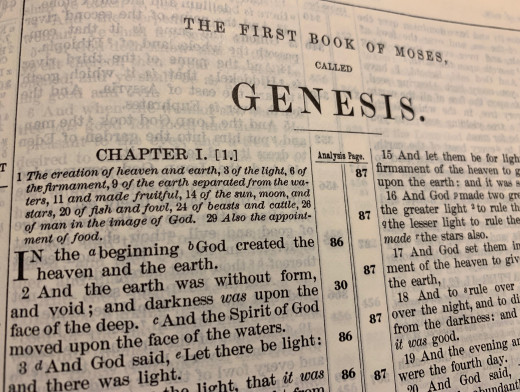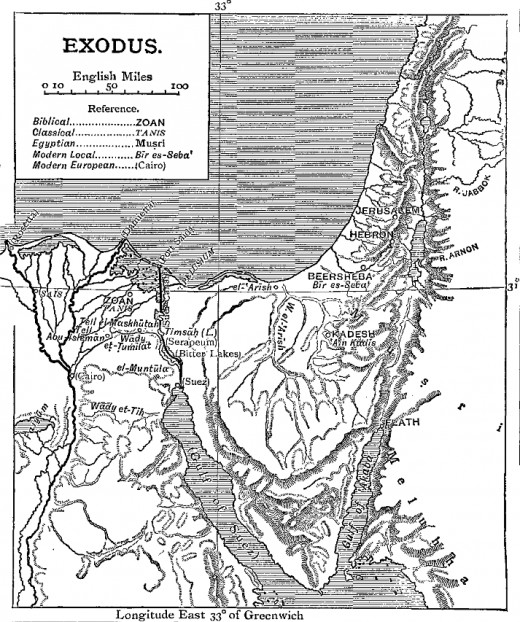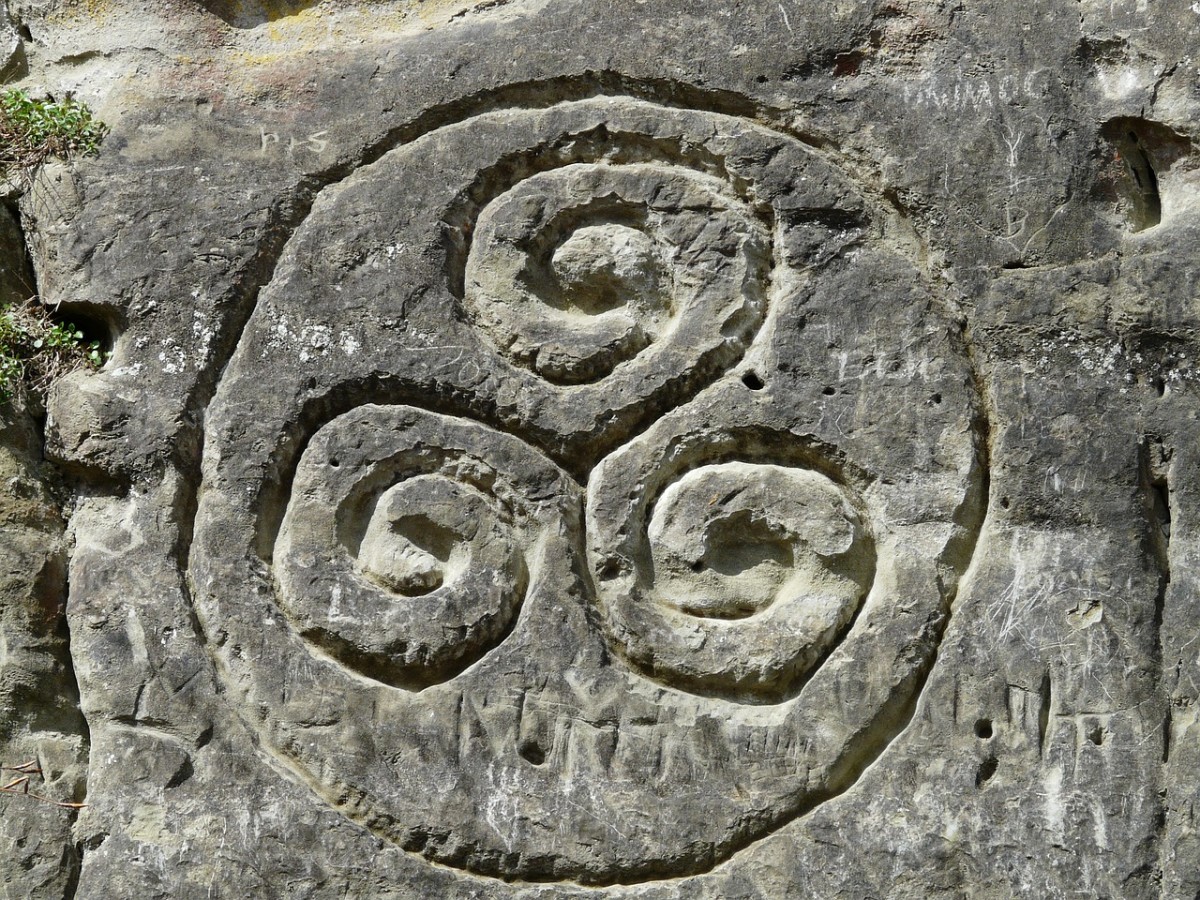He Said It, and It Was So: God's Authority in the Old Testament

To members of the Christian faith, the Holy Bible is the word of God. It is the text that all Christian morals and values are drawn from, in the form of laws and commandments set forth by the Lord. This fact presents the question, how is God able to convince such a large population that his word is supreme? In the Old Testament, the interactions of the Lord with man are both frightening and persuading and are effective in establishing his authority over the earth and all its inhabitants, especially human kind through punishment, reward, and sheer power. Though God must reaffirm his authority several times, it is clear that the people of the world respect his authority over them and their actions.
God's Authority
In order to effectively explain God's authority in the Old Testament, authority must first be defined. It terms of the Bible, authority is the Lord ultimately being able to shape the earth any way he wants and able to get man to follow his will, even if it is against man's interest. The Lord's authority is unique, in that he, being omnipotent and omniscient (Genesis 1:1-2), can never be wrong and can never be challenged by man, thus questioning God's authority is never a justified action. However, it is frequently necessary for the Lord to utilize his powers to reinforce his authority to subsequent generations of man.
From the very beginning, God established an unquestionable authority by creating everything from nothing (Gen 1:1), including light, heaven, earth, plants, animals, and finally man (Gen. 1:3-27). This is also the first instance of God actually asserting his authority directly to man, in the form of giving man dominion over “the fish of the sea and over the birds of the air and over every living thing that moves upon the earth” (Gen. 1:28). God begins his authority with creation and reward, however, it becomes clear not much later that this is definitely not the most effective method of doing so. After God lays down the law of the Garden of Eden, and instructs man not to eat the fruit of the tree of knowledge (Gen. 2:17), woman, at the suggestion of the serpent, disobeys and eats the fruit and gives some to man (Gen. 3:6). While this does seem in direct challenge to God's authority, it was actually God's will for this to happen, as his omniscience allowed him to know that this was going to happen before it did. This gave the Lord the opportunity to reaffirm his authority on stricter grounds, inflicting pain and suffering on mankind (Gen. 3:16-17) and expelling them from the Garden of Eden, thus making them mortal. These first few actions exemplify to the human race the methods of which God has control over them, and how he can be both a giving and strict Lord, thus instilling an initial obedience to God which stems from fear. However, this is just the first of many times that God must reinforce his authority.
Noah and Abraham
One of the instances when God affirms his authority is in the case of Noah and the Ark. The Lord, in his all knowing capacity, determined that man is too evil, and that he must remove them from the earth (Gen. 6:5-7). However, he decides to to spare Noah, as a reward for being “righteous before me in this generation” (Gen. 7:1) This is the single strongest establishment of God's authority in the Old Testament, with God ending all life in a massive flood (Gen. 7:21). Not only does he exert the full extent of his power, he balances the destructive force by showing mercy to Noah and his family. God establishes a covenant with Noah that he will never again inflict this kind of destruction upon the earth (Gen. 9:11). This event instills in Noah, and his posterity, a deep fear, but trust in the Lord, as a God who in an instant can end life and in another better the life of others. The covenant sets a precedent for God to be fair in his methods of authority, however, the flood was an effective means in achieving ultimate authority over man once again.
For generations, Gods authority was not in question, and the Lord decided to test Abraham to see how well his authority was holding up. In book 22 of Genesis, God commands Abraham to offer his son as a “burnt offering” to him (Gen. 22:3). Abraham did as he was told, and just before he killed his son, God stepped in because he knew Abraham was faithful. By this point, God had achieved superior authority over man and to reference back to the previous definition, Abraham followed God's will, even though it was clearly not in Abraham's interest. However, he was willing to carry out the command without question and without complaint.

Exodus
The authority that the Lord establishes in Genesis is heavily based on fear, through the pain and suffering inflicted on Adam and Eve and the flood that ended all life. His frightening powers convinced man that he has true authority. Again, in Exodus, God also establishes his authority through fear and amazing examples of his powers and miracles.
With a separation of 400 years between Genesis and Exodus, it becomes necessary for the Lord to show himself again to reaffirm his authority because all those he had originally established it with had long since passed. God presented himself to Moses in the form of a burning bush, a burning bush that is not consumed and that emanated the voice of God (Exodus 3:2). This miracle proved God's authority to Moses, who then served as an instrument of God, spreading his authority through out Egypt to the Israelites and Egyptians. Through Moses, God demonstrated his powers, resorting again to pain and suffering and destruction, which ultimately leads to the release of the Israelites by the Pharaoh. The defining point, the parting of the sea, finalized God's authority in the eyes of the Israelites, who finally believed that the God who could make a mortal man part a great body of water, was the God who had absolute control over all, and they believed in his authority. Even further, the text directly states that “the people feared the Lord; and they believed in the Lord and in his servant Moses (Exodus 14:31). God's authority had been confirmed with the Israelites through fear, but they also trusted Moses, for his goodness and power, that had been given from God, and thus they also had a trust for God, who could empower and have such a close connection with a mortal.
Upon arrival at Mount Sinai, Moses ascended the mountain and was once again spoken to by God, and this time was given a series of laws for all of the Israelites to follow, and in return the Lord told them that he would keep his covenant with them and give them the land promised to Abraham (Exodus 19:6). The Israelites agree to the terms, mostly out of fear, when they perceive God, “but let not God speak to us, lest we die” (Exodus 20:19). God's authority has inflicted a great fear among the Israelites, and this pleased him, because he was sure his authority would be obeyed. However, after the second time that Moses ascended the mountain, he returned to find that the people had erected a great gold idol, out of worry of Moses's disappearance (Exodus 32:4). This was in clear violation of the Ten Commandments, and God had intended on eliminating humans once again, but Moses reminded him of the covenant he had made. Instead, Moses tries to convince the Lord to forgive the Israelite people for the sin that they had committed (Exodus 32:32). He is unsuccessful, and God inflicts a plague upon the people, before he declares himself as a cooperative God and “Before all your people I will do marvels,” (Exodus 34:10). In this final part of Exodus, the Lord once again uses force and fear to establish his authority. However, compassion also begins to be seen in his actions, with God upholding his covenants and promising to benefit the human race, as opposed to always harming it.
The authority that the Lord establishes in the Old Testament was based in fear and demonstration of power. Through out the generations, it was necessary for God to reaffirm that authority to the people of the world, to be sure that his will was always carried out. Due to his examples of great power, the view of him to the people was frightening, menacing, and threatening. It is fair to say that God was successful in establishing his authority, albeit in destructive, harmful ways, but this method was definitely the most effective for the tone of the Old Testament.
This content is accurate and true to the best of the author’s knowledge and is not meant to substitute for formal and individualized advice from a qualified professional.








